Fengqing Ancient Tree Spring Chun Jian Raw Pu-erh Cake Tea 2012
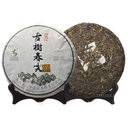 |
|
Commercial Description
...Combining the features of both Ming Qian and Yu Qian, with the excellent skills of tea makers, this Ancient Chun Jian Raw Puerh has an even shape, strong aroma and bright yellowish green color...
Ratings & Reviews
Page 1 of 1 page with 2 reviews
 82 Aroma: 7/10 Flavor: 3/5 Value: 4/5
82 Aroma: 7/10 Flavor: 3/5 Value: 4/5Whiskey (45 reviews) on Dec. 2nd, 2018
When the holidays came around (and the holiday sales) and I was treating myself to one of the more expensive cakes, I picked this one out of all of those available on TeaVivre. The reason that I picked this one was that it's drinkable now, it tastes like it has potential for the future (not all currently drinkable cakes taste like they'll fare well over time), it has a good balance between the presence of notes in the breath and the taste in the mouth, as well as an even effect, and a good bitter note which is present but not intrusive. To compare it to the Xi Gui, in my opinion, the bitter note on the Fengqing Ancient Tree Spring Chun Jian is softer, there are more notes in the taste so the tea's presence is both in the mouth and the breath, and it's more comfortable to drink right now. I do enjoy the Xi Gui, but it's not as comfortable or enjoyable to drink right now. It's not rough, but it edges on it at times, while this one is a gentler experience for me and feels more well-rounded with the distribution of notes. I like the flexibility with this one, too — it's great to have something that's good now and where I also have the option of stowing it away and drinking it later. I don't recall any coughing from roughness in the throat, while the Xi Gui had a coughing effect on me (meaning, it could use more time). I've aged raw pu-erh for more than ten years and that roughness is normal in young cakes and ages out after time. So, it's not something I'd consider a quality issue, it's just a difference in the quality of the leaves and how they're progressing in the aging process. This one is one I'm glad to have for a special treat for now, and I'll keep in mind when drinking it that I shouldn't have too much now because it'll probably be that much better in a few years' time.
(Note: I used the Eastern method directions as provided by TeaVivre when brewing this tea.)
Update: I'm reducing the rating a bit because a cake that I got didn't taste as good as the samples that I'd received before ordering. It has less mouthfeel to it. I was disappointed by that. It may just need time to air out from storage (which is very obviously good, clean, dry storage). I will, of course, keep trying it and will update the rating again with details and a different rating, if its quality changes.
 83 Aroma: 9/10 Flavor: 4/5 Value: 3/5
83 Aroma: 9/10 Flavor: 4/5 Value: 3/5b22johansen (44 reviews) on Sep. 17th, 2015
This was my first experience with Raw Pu'erh, so this review may be biased on that.
I was initially opposed to this tea. It has an overwhelming bitterness to it that seemed to distract from the other flavors. However, after steeping the tea for a much shorter time (only 10-15s in my gaiwan) I managed to balance out the bitterness and astringency with the other flavors. Now I have found that I enjoy it. Obviously I don't have much to compare it to, but it seems quite good. The tea has a strong vegetal astringency matched with a smooth earthy taste.
**UPDATE**
After playing around with this all day I've figured out the right balance of steeping time and amount of tea. Using slightly less tea and the shorter steeping time results in a wonderful light pu-erh that has the distinct earthy taste while also having some vegetal notes and a sweet aftertaste. I'm glad I kept playing around with it!
Page 1 of 1 page with 2 reviews
More Pu-erh Tea from Fengqing, Yunnan, China from TeaVivre
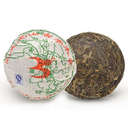
2006 Fengqing Raw Pu-erh Tea Tuocha
| Style: | Raw (Sheng) Pu-erh |
| Region: | Fengqing, Yunnan, China |
| Caffeine: | Caffeinated |
| Leaf: | Compressed |
88
3 Ratings
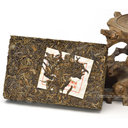
Fengqing Zhuan Cha Raw Puerh Brick Tea 2005
| Style: | Raw (Sheng) Pu-erh |
| Region: | Fengqing, Yunnan, China |
| Caffeine: | Caffeinated |
| Leaf: | Compressed |
57
3 Ratings
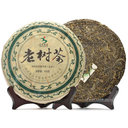
Fengqing Old Tree Raw Pu-erh Cake Tea 2013
| Style: | Raw (Sheng) Pu-erh |
| Region: | Fengqing, Yunnan, China |
| Caffeine: | Caffeinated |
| Leaf: | Compressed |
2 Ratings
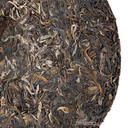
Fengqing Paddy Flavor Raw Pu-erh Cake Tea 2006
| Style: | Raw (Sheng) Pu-erh |
| Region: | Fengqing, Yunnan, China |
| Caffeine: | Caffeinated |
| Leaf: | Compressed |
2 Ratings

